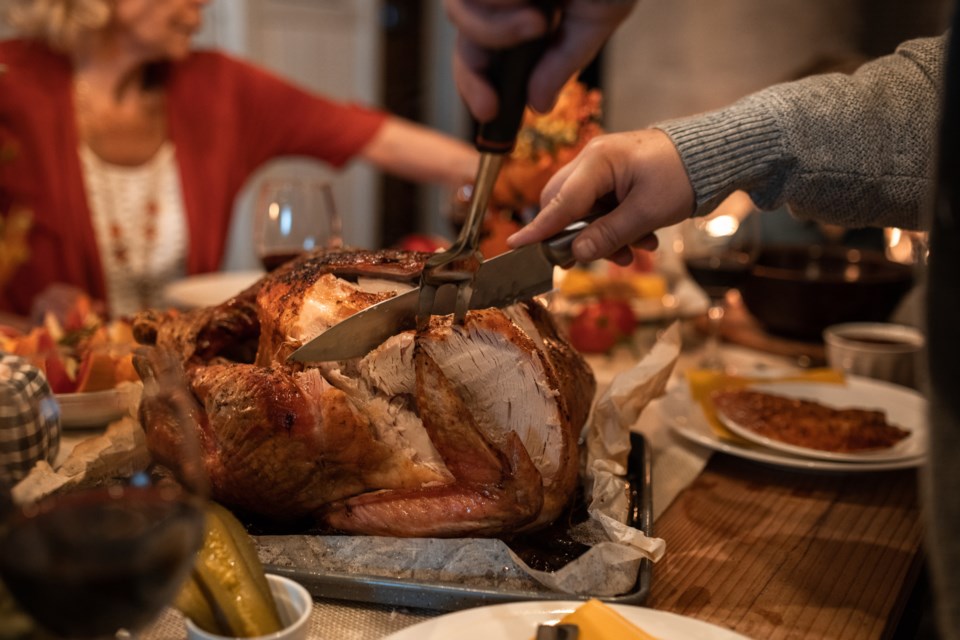Christmas dinner could look different for many people around the region this year due to an outbreak of avian influenza.
With just shy of 700,000 birds impacted by the outbreak in Ontario as of Dec. 9, according to the Canadian Food Inspection Agency (CFIA), local organizations and families have opted to move away from the traditional turkey dinner and instead are considering other options to round out the dishes that will don the table on Dec. 25.
“We made a decision to go with whole chickens as opposed to turkeys for this Christmas as the cost of turkeys was too high for our budget,” Barrie Food Bank executive director Sharon Palmer told BarrieToday.
She said they will also provide clients with stuffing, cranberry sauce and gravy to help make a special meal for the season.
Shane Van Casteren, manager at Nicholyn Farms, located just outside of Barrie on Horseshoe Valley Road in Phelpston, has said they were not expecting any shortages, despite the avian influenza outbreak.
“There is a widespread problem in both B.C. and Ontario, but we do deal with two local farms that we have been dealing with for a number of years and we’ve not yet heard that there is an issue,” he told BarrieToday. “As far as I know, we will be getting the number of turkeys we’d been intending to get.”
Van Casteren noted the local farm market is expecting to sell approximately 2,000 turkeys this season.
More than two years into the COVID-19 pandemic, Barrie & District Christmas Cheer, which provides nearly 1,700 families in need with a food hamper and new, unwrapped toys for Christmas, has grown used to finding unique ways of continuing to provide the support they’ve become known for, officials say.
The organization typically supplies each family with one turkey per household, but this year will be providing families with a full-sized ham instead. This comes after organizers received what they called a “shocking” phone call from their supplier to inform them that their order of more than 1,000 turkeys had been cancelled.
Greg Bray, owner of Maple Heights Farm in Innisfil, told BarrieToday they have been receiving an influx in calls from people asking about the availability of turkeys, noting the small farm is focused on raising breeding stock for other farms that will then raise the turkeys themselves.
“I know a lot of people have lost turkeys … so we are saving most of our turkeys — we didn’t butcher them — for next year for egg production and selling the eggs for hatching and the pullets (newborn turkeys) to replenish that,” Bray said. “That’s the big thing is everyone has a shortage right now, but where does your breeding stock come from next year with what’s going on?”
Bray said they only raise what are called "heritage breeds."
“We don’t have the factory birds — the quick growth. We are all about slow growth and sustainability. Ours … look just like the wild turkeys. They are slower to grow, but they also don’t take as much input,” he said. “We are getting ready for growing the stock for next year. There have just been so many taken out.”
This type of “rare” breed of turkey, Bray explained, is not as susceptible to the avian flu, as they’re not bred in a "monoculture environment."
“The turkeys are exposed to more of nature, so they have an immune system, whereas the factory birds don’t. That’s a big part of the problem,” he said. “One of the traits with our turkeys is, at the end of hatching the eggs and us selling the eggs, we allow them to sit on their nests and raise their own young for the next year. That way they have natural traits.”
Bray added with few turkey operations in the region, being able to plan for the future is key.
“Sure, if you’ve got the turkeys and are able to … bring them in to be processed. There is a lot of money to be made on the turkeys this year, but then next year, what are you going to have? There will be nobody to give you that breeding stock.
"For us, it’s great ... and our whole goal is to have it be sustainable.”



